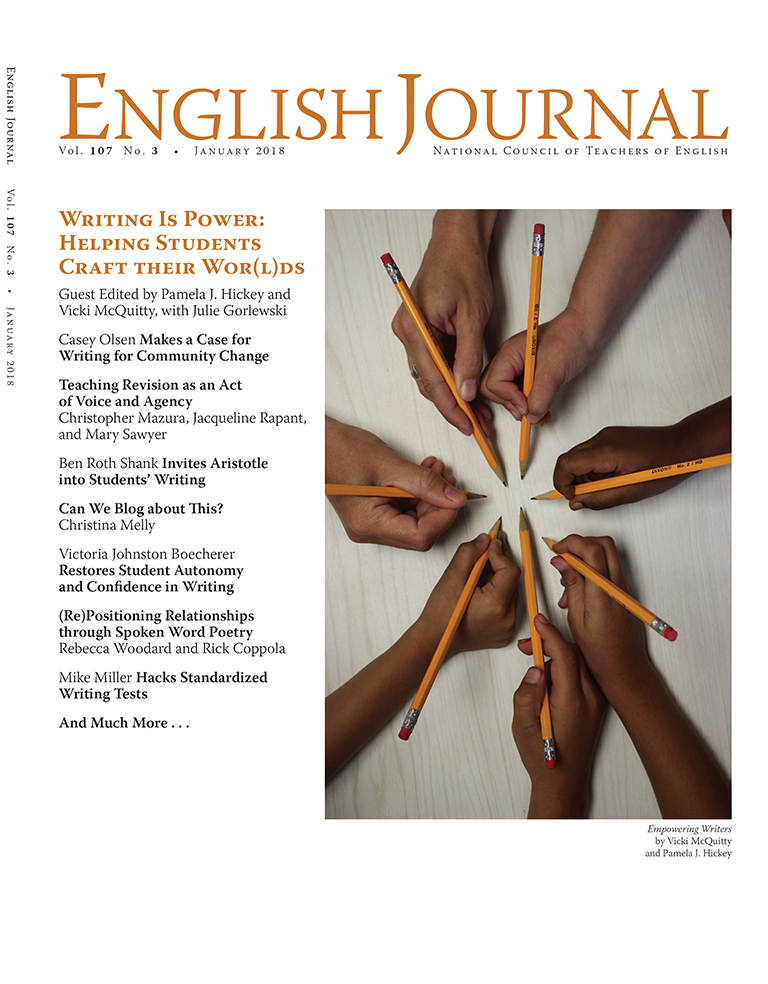This post is written by members Pamela J. Hickey and Vicki McQuitty.
Words are power(ful). As teacher-writers, we know the power of crafting our world by strategically crafting our words. We wish for our students to realize this power, but too often, they experience the opposite. Rather than crafting words for meaningful and important purposes, they write with neither conviction nor commitment: to placate their teachers, to get a grade, to just get it done.
In inviting submissions for this issue, we hoped to receive stories of classrooms where students engage in authentic, world-changing writing. We asked, “How do teachers inspire their students to take ownership of their words, say something important, and add their voices to the conversations around them?” The articles in this issue answer these questions in ways that inspired and sometimes surprised us. In curating the issue, we have sought to share a wide range of voices and a wide range of possibilities for empowering adolescent writers. Through spoken word poetry and blogs, and—yes—even through grammar instruction and standardized tests, student writers are using words to craft their wor(l)ds, both in and outside of school.
While the articles in this issue offer a variety of perspectives, they also reflect some common themes. First, young writers are empowered when they see how writing can help them live better lives and better the lives of those around them. April Brannon takes us onto the Appalachian Trail and explains how writing can help students lead fuller, more humane lives by encouraging them to notice the vibrancy of the natural world. Rebecca Woodard and Rick Coppola demonstrate how spoken word poetry can empower young people to reposition themselves proactively within their peer communities, while Rob Simon, benjamin lee hicks, Ty Walkland, Ben Gallagher, Sarah Evis, and Pamela Baer demonstrate how digital composing can open up possibilities for adolescents to reimagine both their own and others’ identities. Sarah K. Gunning explains how to prepare adolescents for the professional writing required on the job market, empowering those who are often marginalized in today’s college-prep-focused schools: students who plan to go directly into the workforce. And Casey Olsen shows us how classroom argument writing can bring about real and lasting change as students offer solutions to the challenges faced by their local communities.
Young writers are also empowered when they learn to co-opt traditional texts and processes for their own purposes. Mike Miller’s students reasserted their individuality and voice by writing alternative genres on standardized tests, while those in Ben Roth Shank’s classroom used an ancient rhetorical heuristic—Aristotle’s enthymeme—to empower their argument writing. Victoria Johnston Boecherer argues that students can “exceed [their] formulaic limits” when they read texts closely and value their own thinking, rather than imitate the traditional five-paragraph theme. In fact, even grammar instruction can empower: Michelle D. Devereaux and Darren Crovitz explain how students can intentionally and subversively use grammar as a communication tool. In addition, Amber Warrington, Lauren Graeber, Holland White, and John Saxton explain how to transform classroom writing assessment into an opportunity for students to take risks and take up writerly identities; David Narter explains how to transform traditional modes of feedback into multimodal feedback that can help students to gain confidence as writers; and Christopher Mazura, Jacqueline Rapant, and Mary Sawyer explain how to transform revision from a procedure students must complete into a space for voice, agency, and community.
Finally, young writers are empowered when writing serves social, as well as academic, purposes. Christina A. Melly describes how blogging about literary content created a community of writers in her classroom, while students in Jessi Thomsen’s Upward Bound program composed images as a way to both engage with intellectual content and collaborate and invest in the classroom community. Molly Buckley-Marudas and Katharina Cerny show us how, by “going public” with their writing, students were empowered and enabled to challenge their identities as nonwriters.
We wish to acknowledge the marvelous editors of English Journal, Julie Gorlewski and David Gorlewski, for the privilege of editing this issue. None of this work would have been possible without the tireless efforts of Nicholas Shipman, EJ’s editorial assistant. We also want to thank senior editorial associate Theresa Kay, production editor Rona Smith, and Kurt Austin. Finally, we want to thank the teacher-writers who believed in this topic and its importance in classrooms. We received more than 70 manuscript submissions, and the most difficult part of this process was selecting to showcase a representative few among the many amazing stories. We appreciate the work of all of those who sent their stories and allowed us, and now readers, to witness how writing can transform the world.
 Pamela J. Hickey is an assistant professor in the Department of Elementary Education at Towson University, where she teaches courses about multilingual literacy and writing instruction. She has been a member of NCTE since 2013 and can be reached at phickey@towson.edu.
Pamela J. Hickey is an assistant professor in the Department of Elementary Education at Towson University, where she teaches courses about multilingual literacy and writing instruction. She has been a member of NCTE since 2013 and can be reached at phickey@towson.edu.
 Vicki McQuitty is an associate professor of elementary education at Towson University, where she teaches courses about writing and writing instruction. She has been a member of NCTE since 2008 and can be reached at vmcquitty@towson.edu.
Vicki McQuitty is an associate professor of elementary education at Towson University, where she teaches courses about writing and writing instruction. She has been a member of NCTE since 2008 and can be reached at vmcquitty@towson.edu.

